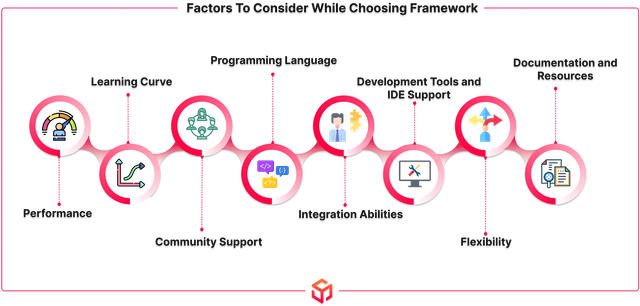Factors To Consider While Choosing Android App Development Framework
Choosing the right Android app development framework is crucial to the success of your project. Several factors should be considered before making a decision. Here are some key factors to take into account:

-
Project Requirements:
- Analyze the specific requirements of your app, including its complexity, features, and functionalities. Some frameworks may be better suited for simple apps, while others excel at handling more complex projects.
-
Developer Expertise:
- Consider the expertise and experience of your development team. If your team is proficient in a particular programming language (e.g., JavaScript or C#), it might influence the choice of framework that aligns with their skill set.
-
Performance:
- Native development generally provides the best performance since it directly utilizes device-specific features. However, some cross-platform frameworks have made significant improvements in performance. Evaluate the performance needs of your app to choose an appropriate framework.
-
Time-to-Market:
- Cross-platform frameworks often enable faster development by allowing code sharing across platforms. If time-to-market is crucial, these frameworks might be a suitable choice.
-
User Experience (UX):
- Consider the user experience you want to deliver. Some frameworks provide native-like UI components, animations, and interactions, while others may feel more like web applications. Ensure that your chosen framework can deliver the desired UX.
-
Third-Party Library Support:
- Check if the framework supports essential third-party libraries or integrations you may need in your app. Robust library support can significantly speed up development and extend the app's functionality.
-
Platform Independence:
- If you plan to target multiple platforms (e.g., Android and iOS), choose a cross-platform framework that supports seamless code sharing between platforms. This can save development time and resources.
-
Community and Documentation:
- Consider the size and activity of the development community behind the framework. A thriving community ensures ongoing support, regular updates, and a wealth of online resources.
-
Maintenance and Long-Term Support:
- Assess the framework's maintenance and long-term support. Choosing a well-maintained framework ensures that your app remains compatible with future Android updates and features.
-
Licensing and Costs:
- Some frameworks may have licensing costs, usage limitations, or subscription models. Evaluate the costs involved and ensure they align with your budget and business model.
-
Popularity and Market Adoption:
- Look at the popularity and market adoption of the framework. Widely adopted frameworks often have a broader talent pool of developers and are more likely to be supported in the future.
By carefully considering these factors, you can make an informed decision about the best Android app development framework for your project, ensuring a smooth and successful app development process.